|
Books Publication
|
|
|

|
Title:
Urban 20 India- Perspective, Issues and Way Forward
|
About the Book:
Cities are key players in global development, driving economic growth but
also facing challenges like climate change, resource depletion, and socio-economic
disparities. Urbanization offers an opportunity to foster equitable and sustainable
development. In the context of India's G20 presidency, the Urban 20 (U20) group,
initiated in Buenos Aires in 2018, aims to turn intentions into actions by addressing
policy gaps and leading global transformation. This book, based on the national
seminar "Urban 20 India: Emerging Perspective, Issues and Way Forward" (Feb 27-28,
2024), features 31 papers and offers valuable insights into urban governance, development,
and policy recommendations. It provides a roadmap for policymakers to address emerging
urban challenges.
|
Author(s)/Editor(s):
Dr. Awadhesh Kumar Singh
Dr. Alka Singh
Dr. Nasruddin
|
ISBN:
978-81-974207-3-3
|
Year of Publication:
2024
|
|

|
Title:
ODF Sustainability and Waste Water Management in Villages on the Bank of River Ganga
in Uttar Pradesh
|
About the Book:
The book discusses the achievement of declaring 4,480 villages along the
Ganges River open defecation free (ODF) under the "Namami Gange" campaign, encompassing
all five Ganga basin states. It highlights the challenge of providing environmentally
safe sanitation in the world's most populous country and emphasizes the critical
connection between water, sanitation, and health. Sanitation, now a comprehensive
concept, includes food hygiene, waste disposal, and cleanliness, crucial not only
for health but also for social well-being. It explores the Swachh Bharat Mission's
success in transforming into a people's movement, catalyzing a sanitation revolution.
The book underscores the need to sustain these achievements and ensure continued
benefits for cleanliness and health. Through a study in Uttar Pradesh districts
along the Ganga, it addresses rural sanitation dynamics, sustainability, and wastewater
management, offering insights into these critical issues.
|
Author(s)/Editor(s):
Dr. Awadhesh Kumar Singh
Dr. Nasruddin
|
ISBN:
978-93-91844-90-5
|
Year of Publication:
2023
|
|
|
|

|
Title:
Implementation of Prime Minister Housing For All Mission: A Study of Performance
And Impact on Beneficiaries in Selected Cities Of Uttar Pradesh
|
About the Book:
The book delves into the challenges posed by urbanization and the strain
it places on urban infrastructure and services. It emphasizes the critical role
of infrastructure development in economic growth and the emergence of urban centers
as engines of growth. However, it highlights a concerning lack of adequate housing
in urban India, leading to a decline in service quality across various sectors including
housing, transportation, healthcare, power, water supply, sanitation, and education.
Recognizing housing as a crucial aspect of human life with the potential to contribute
to national income and development, the Prime Minister's Housing for All (Urban)
initiative was launched in India. This program aims to provide quality housing to
economically weaker sections (EWS), lower-income groups (LIG), middle-income groups
(MIG), and slum dwellers by 2022. Notably, significant progress has been made, with
11.2 million houses sanctioned under PMAY-U as of June 2021, out of which 4.8 million
have been completed. Against this backdrop, the book investigates the implementation
of the PMAY-U initiative and its impact on beneficiaries in Uttar Pradesh. It is
expected to provide valuable insights into the performance of the housing initiative,
housing conditions, and the challenges encountered in its implementation in the
state.
|
Author(s)/Editor(s):
Dr. Anjuli Mishra
Er. Awadhesh Kumar Gupta
Dr. Awadhesh Kumar Singh
|
ISBN:
978-93-91844-79-0
|
Year of Publication:
2023
|
|
|
|

|
Title:
Assessment of Sustainability of Open Defecation Free Cities in Uttar Pradesh
|
About the Book:
The book addresses the challenges in providing sustainable sanitation services
in India, particularly in urban areas where municipal governments often prioritize
other sectors over sanitation. Sanitation entails facilities and services for managing
excreta and wastewater while ensuring individual dignity and a clean living environment.
This includes the collection, transportation, treatment, and disposal of domestic
wastewater and solid waste, alongside hygiene promotion. Initiatives like Swachchata
Sarvekshan and protocols such as ODF, ODF+, and ODF++ were introduced by the Indian
government to ensure the long-term viability of inclusive sanitation infrastructure.
Focusing on selected cities in Uttar Pradesh, the book examines the status of urban
sanitation, including faecal sludge, septage, and wastewater management. It aims
to shed light on the current challenges and evolving strategies for achieving sustainable
and inclusive urban sanitation.
|
Author(s)/Editor(s):
Dr. Rajeev Narayan
Dr. Nasruddin
|
ISBN:
978-93-91844-67-7
|
Year of Publication:
2023
|
|
|
|

|
Title:
Impact Assessment of AMRUT Reforms Implementation in Achieving Good Urban Governance
|
About the Book:
The book delves into the history and significance of urban reforms in India, tracing
back to the introduction of the 74th Constitutional Amendment Act in 1992, which
granted statutory status to urban local governments. Subsequent reforms, including
the 23 introduced under the Jawaharlal Nehru National Urban Renewal Mission (JnNURM)
in 2005 and the 11 reforms under the Atal Mission for Rejuvenation and Urban Transformation
(AMRUT) in 2015, aimed to strengthen urban local bodies (ULBs) across the country.
Focusing specifically on Uttar Pradesh, the book examines the status of urban reforms
under AMRUT and their implications for achieving good governance. It provides insights
into the policy perspective and rationale behind urban reforms, shedding light on
their implementation in ULBs and offering a roadmap for further strengthening urban
governance. Overall, the book serves as a valuable resource for understanding the
evolution of urban reforms in India, particularly in Uttar Pradesh, and their role
in enhancing the functioning of urban local governments.
|
Author(s)/Editor(s):
Mr. Ajit Kumar Mishra
Dr. Alka Singh
|
ISBN:
978-93-91844-92-9
|
Year of Publication:
2023
|
|
|
|

|
Title:
Involvement of Stakeholder’s Engagement in Last Mile Connectivity along Metro Stations
in Lucknow
|
About the Book:
The book explores the overlooked aspect of last mile connectivity (LMC) in Indian
cities, including Lucknow, focusing on the challenges and potential solutions. It
assesses the comfort, time, space, and cost involved in LMC compared to the total
journey for users of rapid transportation systems. The study also investigates user
preferences for LMC options and their impact on commuters' choice of transport modes.
With a particular focus on the Lucknow Metro, a major public mass transit system
in Uttar Pradesh, the book examines its North-South Corridor, spanning from Munshipulia
to Chaudhry Charan Singh International Airport, with 21 stations along a 23 km route.
Despite potential last mile connectivity issues, the metro proves beneficial for
passengers. The study evaluates current metro ridership, identifies factors contributing
to low usage, and proposes improvements for Lucknow Metro services. Additionally,
it provides an overview of Intermediate Public Transport (IPT) vehicles such as
autorickshaws, tempos, and e-rickshaws in Lucknow, gathered through stakeholder
surveys, offering insights into their operational, economic, and vehicular characteristics.
By incorporating stakeholder perspectives, the book offers valuable insights into
Lucknow's mobility landscape and aims to inform strategies for enhancing last mile
connectivity and metro ridership.
|
Author(s)/Editor(s):
Mr. Himanshu Chandra
Ms. Sachi Rai
|
ISBN:
978-93-91844-89-9
|
Year of Publication:
2023
|
|
|
|

|
Title:
Urban Sanitation, Septage and Waste Water Management in Uttar Pradesh
|
About the Book:
The book emphasizes the critical importance of providing environmentally safe sanitation
to the people, highlighting various measures undertaken by the Government of India
to improve sanitary conditions, especially in urban areas. It discusses the launch
of the Swachh Bharat Mission in 2014, aimed at eliminating open defecation and enhancing
urban sanitation. The health and environmental costs of inadequate sanitation, particularly
the pollution caused by untreated sewage, are underscored. In urban areas, the majority
of sanitation facilities consist of on-site systems like pit latrines and septic
tanks, posing challenges for treatment and disposal. The book emphasizes the need
for proper construction, maintenance, and management of these systems, as well as
addressing the issues of faecal sludge and septage/sewerage. It advocates for a
holistic approach to sanitation, tailored to local needs and conditions. Focusing
on selected small cities in Uttar Pradesh, the book aims to assess the current status
of urban sanitation and proposes a roadmap for improvement. By addressing these
issues, it seeks to contribute to the overall goal of ensuring safe and sustainable
sanitation for all.
|
Author(s)/Editor(s):
Er. Awadhesh Kumar Gupta
Dr. Awadhesh Kumar Singh
Ms. Sachi Rai
|
ISBN:
978-93-91844-72-1
|
Year of Publication:
2023
|
|
|
|

|
Title:
Gap Identification on Education of Scheduled Tribes Girls in Uttar Pradesh
|
About the Book:
The book discusses the socio-economic changes in Indian society brought about by
legislative and constitutional initiatives over recent decades, particularly focusing
on the impact on tribal development. Despite government efforts since independence,
tribal communities still face significant obstacles in achieving educational progress,
especially for girls. While initiatives like Ashram schools and scholarship schemes
have been implemented, there remain gaps in infrastructure and services, particularly
for tribal girls' education. The book aims to shed light on the current status of
education among tribal girls in Uttar Pradesh and identify areas for improvement
in their educational development.
|
Author(s)/Editor(s):
Dr. Nasruddin
Dr. Awadhesh Kumar Singh
|
ISBN:
978-93-91844-84-4
|
Year of Publication:
2023
|
|
|
|

|
Title:
Urban Services In Small And Medium Towns of Uttar Pradesh With Special Focus On
Religious and Tourist Importance
|
About the Book:
The book addresses the challenges posed by urbanization, particularly in small cities
with cultural significance, where unplanned growth leads to issues in urban development
and municipal governance. Despite urban centers being crucial for economic growth,
inadequate infrastructure and services drive migration towards larger cities. This
lack of basic amenities, including piped water supply, drainage, waste management,
and sanitation, hinders investment and tourism potential. Focusing on the importance
of cultural and religious tourism, the book explores the untapped market and the
challenges of providing essential services in culturally significant small cities
with high floating populations during special occasions. It assesses the current
status of urban infrastructure and municipal services, highlighting critical gaps
and areas for improvement.
|
Author(s)/Editor(s):
Dr. Alka Singh
Ms. Shachi Rai
|
ISBN:
978-93-91844-81-3
|
Year of Publication:
2023
|
|
|
|

|
Title:
Engendering Skill Development
|
About the Book:
Engendering development and inclusive growth requires an enabling environment
in which women’s contribution to the economy can be tapped and enhanced in a substantial
and holistic way. The engendered development also requires addressing the issues
of accountability, capacity building and governance that are of utmost importance
for gender equity and inclusive growth. Skill development has been considered as
the backbone of economic development. Entrepreneurship, skill development and new
venture creation has long been a driving force in commercializing new technologies
and developing new markets, creating new jobs, and growing economies. It has been
well established that the level of economic growth of a region, to a large extent,
depends on the level of entrepreneurial and skill development activities in the
region. Government of India has launched National Skill Development Mission and
National Skill Development Policy. The national policy on skill development envisages
to creating opportunities for all to acquire skills throughout life and specially
for youth, women and disadvantaged group, promoting commitment by all stakeholders
to own skill development initiatives, developing a high-quality skilled workforce,
entrepreneurs relevant to emerging employment market needs. Against this view point,
Bharatiya Institute for Research & Development (BIRD), Lucknow , organized a two
days National Seminar on Empowerment of Women through Skill Development and Training:
A Critical Analysis of Government Policies and Programmes with regard to Gender
under the auspices of National Commission for Women , Ministry of Women and Child
Development , Government of India on March 25-26, 2017 at Lucknow. The volume presents
25 well written selected papers presented in the national seminar. The papers focus
on various issues, dimensions and aspects of skill development, women entrepreneurship,
training and placement, enterprises development and other related areas. It is expected
that the volume will be helpful in understanding in gender perspective in skill
development and training.
|
Author(s)/Editor(s):
Awadhesh Kumar Singh and Satya Prakash Pandey
|
ISBN:
9789389930177
|
Year of Publication:
2022
|
|
|
|

|
Title:
Impact Assessment of Skill Development Programme in Uttar Pradesh
|
About the Book:
Skill development has been considered as the backbone of economic development.
Entrepreneurship, skill development and new venture creation has long been a driving
force in commercializing new technologies and developing new markets, creating new
jobs, and growing economies. It has been well established that the level of economic
growth of a region, to a large extent, depends on the level of entrepreneurial and
skill development activities in the region. Government of India has launched National
Skill Development Mission and National Skill Development Policy. The national policy
on skill development envisages to creating opportunities for all to acquire skills
throughout life and specially for youth, women and disadvantaged group, promoting
commitment by all stakeholders to own skill development initiatives, developing
a high quality skilled workforce, entrepreneurs relevant to emerging employment
market needs. The policy has widened the scope of skill training and entrepreneurship
development through utilizing the existing educational infrastructure and expansion
of institutions engaged in skill training and vocational education. Government of
India has also introduced several schemes, programmes and projects for providing
training, vocational education and entrepreneurship development to youth, women
and disadvantaged groups. In view of the high national priority, Government of Uttar
Pradesh has also introduced state Policy for Skill development and established U.
P. Skill Development Mission with vision and strategic plan. The present book attempts
to evaluate the performance and assessment of the impact of Uttar Pradesh Skill
Development Mission on the skill development and placement of youth. It is expected
that the book will be highly useful in understanding the performance and impact
of skill development initiatives and evolving the roadmap for creating the conducive
climate for skill development and placement of youth.
|
Author(s)/Editor(s):
Awadhesh Kumar Singh and Satya Prakash Pandey
|
ISBN:
9789389930191
|
Year of Publication:
2022
|
|
|
|

|
Title:
Municipal Finances: A Study of Ranchi Municipal Corporation in Jharkhand
|
About the Book:
Urban local governments are entrusted with a set of responsibilities of
providing basic urban amenities and services to the people. They are dependent on
states and centre for grant in aid and loans as the own resources of ULBs are grossly
inadequate. There is mismatch between functions and municipal resources. The efforts
for additional resource mobilization to fulfil the commitments by the ULBs are not
adequate due to various factors. The ULBs are becoming dependent on transfers and
fiscal devolution from central and state governments to meet out their financial
requirements. Central Government has launched Missions and schemes for infrastructure
development in selected cities and towns with massive financial investment. These
schemes envisage strengthening of urban local bodies through introducing reforms
and stepping up concrete efforts for additional resource mobilization. Thus, it
is necessary to reduce dependence of local bodies on government support. They should
effectively exploit the revenue potential through rationalization of assessment
norms, simplification of procedures; rebate on timely payment, revision of old levies
and taxes etc. Municipal governments may be allowed to enjoy fiscal autonomy with
freedom of choice in regard to imposing new taxes and revising tax rates. It is
argued that municipal bodies are not financially strong enough to tap capital market
for undertaking infrastructure works which involve huge capital investment, long
gestation period. But the provision of marketing borrowing will certainly motivate
the municipal bodies to revamp their financial strength to mobilize resources from
market. There is also need to encourage private sector involvement in the development,
strengthening and creator of urban infrastructure. The present book based on research
highlights the emerging trends and patterns in municipal finances in Jharkhand state
in general and Ranchi Municipal Corporation in particular. It also presents the
perspective of municipal finances and scope of resource mobilisation. It is hoped
that the book will be useful in understanding the dynamics of municipal financial
resources and evolving the roadmap for resource mobilisation in urban local governments.
|
Author(s)/Editor(s):
Awadhesh Kumar Singh and Satya Prakash Pandey
|
ISBN:
9789389930160
|
Year of Publication:
2022
|
|
|
|

|
Title:
Sustainable Rural Development : Issues and Challenges
|
About the Book:
India has achieved significant progress in human and economic development
since independent. However, the path of economic development and growth has been
challenging one since environmental sustainability is a major challenge in India.
There is degradation of natural resources due to overexploitation, unsustainable
economic and commercial activities and poor governance of environmental regulation,
policies and enforcement of legislations. Various action and policy measures for
sustainable development focus on specific plan of action. These include policy reforms,
introduction of market-based instruments and legislative-institutional changes.
The inter-linkages between economy and environment are well established and therefore,
environmental problems are to be examined while efforts of the environmental protection
and conservation are to be reviewed in order to seek the path of the sustainable
development. Thus, it is imperative to adopt development paradigms which are sustainable.
The present volume , consisting of 26 well written papers highlight the aspects
, dimensions and different issues of changing rural life, livelihood and entrepreneurship
development and sustainable development in rural perspective . It is hoped that
the volume will be helpful in understanding in the dynamics of rural sustainable
development and evolving the road map for adopting suitable development paradigms
for rural development in the context of environmental sustainability.
|
Author(s)/Editor(s):
Awadhesh Kumar Singh and Satya Prakash Pandey
|
ISBN:
9789389930184
|
Year of Publication:
2022
|
|
|
|

|
Title:
Disadvantaged Children in India Perspective, Issues and Their Rehabilitation
|
About the Book:
India is home of almost 20 per cent of the world’s children. More than
one third of the country’s population, around 400 million, is below 18 years. All
children have the right to be protected whatever they are. Their right to protection
is intrinsic to their well-being, as the right to survival, development and participation.
Children deserve to live in an environment where good governance and the full enjoyment
of human rights are mutually reinforcing. India has recognized the right to protection
for its children through its Constitutional commitments and the laws, policies and
programmers. Children need access to nutrition, basic social services, such as health,
education, protection, and care to improve their welfare and their capacity. Delivery
of social services requires increasing financial resources and particularly, the
quality of public expenditure in these areas. The governance of social services,
particularly care and protection of vulnerable, marginalized, and other disadvantaged
children may be improved through pubic private partnership as well as ensuring administrative
reforms and children’s centric development approach.Present volume deals with socially
relevant issues of child destitution, child marriage, juvenile delinquency, disability
among children and their rehabilitation , besides dealing with policy perspective
and legal measures for protection and rehabilitation of disadvantaged children .
It is expected that the book will be highly useful in understanding of the pertinent
issues and evolving the roadmap for care, protection and rehabilitation of marginalized
and disadvantaged children in India.
|
Author(s)/Editor(s):
Om Prakash Singh and Awadhesh Kumar Singh
|
ISBN:
9788195260850
|
Year of Publication:
2022
|
|
|
|

|
Title:
Status of Minority Women In India
|
About the Book:
Development alone cannot bring peace and prosperity unless social justice
and gender equality are ensured. Women are major contributors to India’s economy
and important constituent of development. Their empowerment is essential for distributive
justice for the nation’s growth. Engendering national development plans is imperative
for gender mainstreaming and their empowerment. Engendered development plans would
include a gender dimension in all macro policies and budgetary support for their
implementation. Women’s needs are multi-dimensional – access to health and nutrition,
water and sanitation, asset based marketing, credit, technology, education and skills,
political participation etc. Thus, convergence of development policies, programmes,
schemes and institutional resources is imperative for engendering and inclusive
development. Against this backdrop, present book highlights to examine the profile
of the women belonging to minority communities in selected 13 states of India. It
is expected that the book will be of immense importance for understanding the status
of minority women in India and evolving road map for their empowerment.
|
Author(s)/Editor(s):
Awadhesh Kumar Singh and Om Prakash Singh
|
ISBN:
9788195288717
|
Year of Publication:
2021
|
|
|
|

|
Title:
An Evaluation of Post Matric Scholarship Scheme for Other Backward Classes in India
|
About the Book:
Educational empowerment of the weaker sections has been the priority of
government for their mainstreaming in development and governance. Scheduled Castes,
Scheduled Tribes, OBCs and Minorities are included in the weaker sections of the
society. In order to provide them due share in educational institutions and government
services, reservations has been given to them besides introducing educational and
economic empowerment programmes and schemes for their overall empowerment and development.
Post Matric Scholarship Scheme has been launched by the Ministry of Social Justice
and Empowerment, Government of India for attaining higher education by OBC students.
The scheme has no doubt impacted on the educational empowerment of weaker sections
students besides their overall preparation and attaining higher education however;
constraints and drawbacks in effective implementation of the scheme are reported.
In view of the above, the present study has been carried out to examine the functioning
and performance of central sector scheme and suggesting a roadmap for effective
functioning of the scheme and achieving desired result. It is expected that the
book will be highly useful in understanding of the functioning of the Post Matric
Scholarship Scheme and evolving the roadmap for improving the performance of the
scheme as well as achieving the desired results of the scheme.
|
Author(s)/Editor(s):
Awadhesh Kumar Singh and Om Prakash Singh
|
ISBN:
9788195288779
|
Year of Publication:
2021
|
|
|
|

|
Title:
Inclusive Urban Planning and Gender Budgeting
|
About the Book:
Women constitute about half of the human resources of India , however,
development has by passed them as indicators of development demonstrate that women
are lagging behind their male counterparts. Women are regarded as deity in Hindu
mythology, however, they are exploited, abused, neglected in many spheres while
increasing crimes and violence against has been cause of concern. There has been
paradigm shifts in development and governance in India. The issue of inclusive development
and gender budgeting has been in the central stage at the global level and particularly
in India. Gender budgeting has emerged as an important instrument for gender mainstreaming
and women empowerment across the globe. The policy makers and feminist economists
have well realised that gender budgeting is imperative for gender equality and engendering
development. Gender budgeting refers to the systematic examination of the budget
programmes and policies for the impact on women. Though India has adopted gender
budgeting in 2005 however, gross gender budget constituted about 4.7 per cent of
the union budget and 0.63 per cent of GDP in 2020. Urban centres are engines of
growth as they significantly contribute in GDP of nation. Urbanisation has gradually
increased, however, urban content in population of our country is still low as compared
to many developed and developing countries. Urban development has been gender blind
and gender neutral, though development of inclusive cities was conceptualised during
11 th Five Year Plan (2007- 2012).The functions and working of ULBs affect both
man and woman, however, women have very minimal role as they are under-represented
in decision making and planning for infrastructure development and delivery of municipal
services. Hence, engendering urban planning and gender inclusive municipal budgeting
is called for. Against this backdrop, present book highlights the conceptual framework,
theoretical and policy perspective on inclusive urban planning and gender budgeting.
The book presents decentralised urban governance, urban development schemes and
programmes, gender mainstreaming and women empowerment, policy and theoretical perspectives
of gender budgeting, gender budget analyses of central government. It is expected
that the book will be of paramount importance in understanding of inclusive urban
development and governance as well as gender budgeting in urban local governments.
|
Author(s)/Editor(s):
Dr. A. K. Singh and Dr. Nasruddin
|
ISBN:
97881940552-1
|
Year of Publication:
2019
|
|
|
|

|
Title:
महिला समावेशी नगरीय विकास एवं लैंगिक संवेदनशील बजट
|
About the Book:
महिलाएं देश की आबादी में लगभग पचास प्रतिशत का योगदान करती हैं तथापि देश
की आर्थिक संवृद्धि में उनके योगदान को पर्याप्त महत्व नहीं दिया गया। यही कारण है
कि देश में महिलाएं पुरुषों की तुलना में पिछड़ गयीं। महिलाओं के विरुद्ध सामाजिक सोच
तथा उनके प्रति भेदभाव ने उनकी स्थिति को दयनीय बना दिया है। देश की आजादी के उपरान्त
महिलाओं को विकास प्रक्रिया में जोड़ने के लिए महत्वपूर्ण प्रयास किये गये । इन प्रयासों
में विधिक व संवैधानिक प्राविधानों के साथ अनेक कार्यक्रम व कार्य योजनाएं संचालित
की गयीं। अंतर्राष्ट्रीय दबाव तथा बदलते हुए राजनीतिक परिवेश में महिलाओं की भागीदारी
को सुनिश्चित करने के लिए देश में 73वें व 74वें संवैधानिक संशोधन के माध्यम से पंचायतों
व नगर निकायों में एक तिहाई आरक्षण का प्रावधान किया गया। यद्यपि महिलाओं की राजनीतिक
सहभागिता स्वतंत्रता पूर्व से ही उल्लेखनीय रही है तथापि देश के सर्वोच्च राजनीतिक
संस्थाओं में उनकी भागीदारी आज भी निम्न बनी हुई है। पिछले दशकों में नारी संबंधी अध्ययन
व महिला उत्थान विषयक विचारधाराओं ने बौद्धिक जगत में एक केन्द्रीय व महत्वपूर्ण स्थान
प्राप्त किया है। इन विचारधाराओं में विकास की प्रक्रिया को सामाजिक स्थितियों व उनमें
होने वाले परिवर्तन की गति से संबद्ध करते देखा जा सकता है। सामाजिक परिवर्तन की प्रक्रिया
में क्रया में प्रजाति, जाति, वर्ग व अन्य सामाजिक श्रेणियों में गतिशीलता के आयाम
स्पष्टतः दृष्टिगोचर होते हैं। औद्योगिक क्रान्ति के पश्चात न केवल जीवन शैली व सांस्कृतिक
मूल्यों में परिवर्तन आये हैं अपितु सामाजिक संरचना में भी व्यापक परिवर्तन उभर कर
आये हैं। नये व्यवसायों के प्रादुर्भावों से सामाजिक गतिशीलता को एक आधार मिला व आधुनिकीकरण
की प्रक्रिया में व्यक्ति की स्वतंत्रता व सामाजिक समानता को संख्यात्मक माध्यमों से
क्रियान्वित किया गया। प्रजातांत्रिक व्यवस्था व्यक्ति को समान मताधिकार व भागीदारी
के अवसर प्रदान करती है1 तथापि महिलाओं की राजनीतिक सहभागिता संतोषजनक नहीं है और उनकी
राजनीतिक प्रस्थिति भूमिका संघर्ष के प्रतिमानों को प्रस्तुत करती है। विभिन्न समाजों
में महिलाओं की प्रस्थिति उनकी भूमिका उनके कार्य एवं उनके योगदान को मापने के आधार
भिन्न-भिन्न रहे हैं। उल्लेखनीय है कि नारीवाद एक ऐसा विचार है जो कि पुरुष व स्त्री
के मध्य असमानता को अस्वीकार कर नारी के सबलीकरण की प्रक्रिया को बौद्धिक व क्रियात्मक
रूप से प्रस्तुत करता है। नारीवाद एक विचारधारा भी है और एक आंदोलन भी। नारीवाद के
सिद्धांत के अंतर्गत मूलरूप से समानता व सबलीकरण के माध्यम से महिलाओं व पुरुषों के
मध्य व्याप्त समाजगत असमानता को कम करना है।2 उल्लेखनीय है कि आरक्षण के माध्यम से
सत्ता व शक्ति में भागीदारी नारी की प्रस्थिति को परिवर्तित करने का एक साधन है न कि
साध्य। इस भेद को समझना इसलिए आवश्यक है क्योंकि राजनीतिक संस्कृति व सत्ता की शतरंज
के नियम भिन्न होते हैं जिसमें प्रवेश कर व्यक्ति स्वयं की पहचान एक रूप में खो देता
है और वह उस समूह का सदस्य हो जाता है जिसके उद्देश्य प्रत्यक्ष रूप से व परोक्ष रूप
में भिन्न होते हैं। नारी की प्रस्थिति समय व स्थान के अनुरूप भिन्न-भिन्न रही है।
भारतीय संदर्भ में महिलाओं की राजनीतिक प्रस्थिति व भूमिका को समझने के लिए यह आवश्यक
है कि हम सैद्धांतिक पहलू का भी विवेचन करें। प्रस्तुत प्रशिक्षण माॅड्यूल लिंग संवेदनशील
बजट एवं महिला समावेशी नगरीय विकास के विभिन्न सैद्धान्तिक, नीतिगत तथा व्यवहारिक पक्षों
तथा आयामों का विशलेषण किया गया है। प्रस्तुत माॅड्यूल नगर निकायों के अधिकारियों एवं
जनप्रतिनिधियों हेतु भारत में जेण्डर बजटिंग तथा महिला समावेशी नगरीय विकास को समझने
तथा नगरीय नियोजन तथा प्रशासन में कार्य नियोजन तथा मार्गचित्र बनाने में सहायक होगा।
|
Author(s)/Editor(s):
Dr. A.K. Singh, Dr Nasruddin
|
ISBN:
97881940552-1-1
|
Year of Publication:
2019
|
|
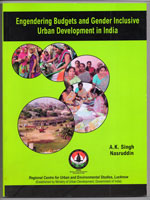
|
Title:
Engendering Budgets and Gender Inclusive Urban Development in India
|
About the Book:
The issue of engendering development and women empowerment has been in
the center stage with the shifting of paradigms of development and governance at
the global level and particularly in India. Gender budgeting has emerged as an important
instrument for gender mainstream and women empowerment across the globe. It has
been well recognized by the policymakers and feminist economists that gender budgeting
is imperative for gender equality and engendering development. Gender budgeting
refers to the systematic examination of the budget programmes and policies for the
impact on women. Studies show that programmes and policies design to improve women’s
economic opportunities lead to higher rates of economic growth. Gender budgeting
has gained prominence in the policy circles in the recent years. Though gender budgeting
has been widely recognized tool for gender mainstreaming and engendering development,
however, the analysis of gross budgetary support for women-specific programmes in
India demonstrates that there has been a meagre share of public expenditure as against
national budgets. Gross gender budget constitutes about 6 percent of the union budget
and even the share of public expenditure for women constitutes less than 4 percent
of GDP. Though, the amount of gross gender budget has shown an increasing trend,
however, its share in gross budgetary support has declined in the recent years The
book highlights Gender Equality and Engendering Urban Development, Policy Imperatives
of Gender Budgeting. The book will be of immense use to the policymakers, administrators,
feminine economists, and development professionals in understanding the dynamics
of engendering urban development and budgeting in India and evolving strategies
for the empowerment of women.
|
Author(s)/Editor(s):
Dr. A.K. Singh, Dr Nasruddin
|
ISBN:
8176691356
|
Year of Publication:
2017
|
|
|
|
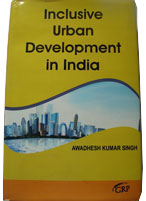
|
Title:
Inclusive Urban Development in India
|
About the Book:
Inclusive urban planning and development has got momentum in the context
of new policy regime and changing economic environment. The 11th Five Year Plan
has emphasized on inclusive policies and programmes for mainstreaming of poor and
marginalized in urban planning and development besides massive investment on urban
infrastructure and service in order to improve the access and delivery of civic
services to urban poor. State governments have also launched inclusive urban development
policies and programmes under the state sector in order to mainstream the urban
poor and marginalized communities. Present book, based on a study conducted under
the auspices of ICSSR, New Delhi, attempts to review the impact of pro-poor programmes
and policies on urban poor and marginalized communities in the selected cities of
Uttar Pradesh and West Bengal In India. Present book deals with trends of urbanization
and urban development; inclusive urban growth and development; concept of inclusiveness,
policy initiatives for urban development during the plan period, inclusive infrastructure
development, service delivery excellence and urban development schemes; urban poverty
alleviation; urban poverty scenario and approaches for reducing urban poverty in
India; inclusive urban planning, policies and strategies of urban development in
India, urban infrastructure, environment and climate change, mission approach and
implementation of municipal reforms; analysis of view perception of officials of
urban local governments; and impact of inclusive planning on urban poor. It is expected
that the book will be highly useful in understanding the dynamics of inclusive urban
planning and development and evolving a road map for mainstreaming of poor in urban
development planning and governance.
|
Author(s)/Editor(s):
Dr. A.K. Singh
|
ISBN:
978-81-89630-89-8
|
Year of Publication:
2016
|
|
|
|
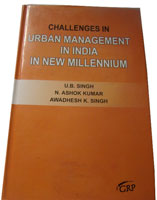
|
Title:
Challenges in Urban Management in India in New Millennium
|
About the Book:
India is on track to witness an unprecedented pace and scale of urbanization.
Census data show that the country’s urban population has grown tremendously. However,
even at the current pace and scale, India is struggling. The delivery of urban infrastructure
and basic services is insufficient to provide citizens with a decent quality of
life. Urban India is underserved by utilities, suffers from inadequate housing stock,
and is highly congested and polluted. The addition of millions of people to urban
India every year puts enormous stress on the urban system. Across all major quality
of life indicators, India’s cities fall well short of not only the levels of service
to which international cities aspire but also even basic standard of living. Rapid
urbanization has resulted in poor quality of life in its cities but worse is ahead
if India continues with current unplanned approach. Thus it is important to realize
that crucial for growth. The situation may deteriorate if urbanization is not managed.
Left unattended, the risk from the ongoing deterioration in the quality of life
will compromise productivity, deter investors and eventually curtail economic growth.
Given the increasing importance of cities, urban India must dramatically step up
its performance on delivering basic urban services, bolster its governance systems,
planning and funding policies, institutions, and capacity and capability. It is
under this backdrop, this volume makes attempt to underline a galaxy of few and
not only challenges and opportunities in regard to changing urban society, land,
housing, poverty, services, slums, street, vending, governance etc. emerging in
managing urban India in new millennium.
|
Author(s)/Editor(s):
Dr. U.B. Singh, Dr. Ashok Kumar, Dr. A.K. Singh
|
ISBN:
978-81-89630-85-0
|
Year of Publication:
2014
|
|
|
|
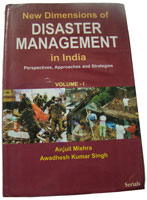
|
Title:
New Dimensions of Disaster Management in India: Perspectives, Approaches and Strategies-
Vol. -1 & 2
|
About the Book:
Disaster management has gained importance in the recent years as India
is witnessing natural and human induced disasters very frequently. Earthquake, cyclone,
land sliding, flash flood, drought, tsunami, forest fire, road accidents, rail and
air accidents, epidemics, etc. cause severe loss of human lives and resources. The
government of India in collaboration with state governments, international donor
agencies and various stake holding agencies is implementing various programmes,
projects and schemes for prevention, mitigation and disaster preparedness, besides
providing policy and legal framework and budgetary support for disaster management.
However, the government alone cannot be responsible for disaster management. However,
the government alone cannot be responsible for disaster management and therefore
various other stakeholders need to shoulder this responsibility. In this context,
a national seminar on Disaster Management in Urban Areas: Role of Stake Holders
was organized to discuss and deliberate on the pertinent issues. The present volume
is the outcome of the seminar. It contains four sections viz. Policy perspective
and government intervention, prevention and mitigation of disasters, climate change
and its implications on disasters, and approaches and strategies. The volume comprises
of 37 well written papers on various dimensions and aspects of disaster management
in India. It is expected that the volume will be highly worth full to the policy
makers, administrators, urban planners, development professionals and other stakeholders
in understanding various pertinent issues and dimensions as well as developing a
road map for disaster preparedness.
|
Author(s)/Editor(s):
Dr. Anjuli Mishra, Dr. Awadhesh Kumar Singh
|
ISBN:
978-81-8387-564-6
|
Year of Publication:
2013
|
|
|
|
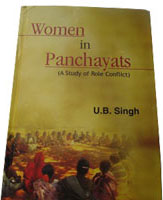
|
Title:
Women in Panchayats (A Study of Role Conflict)
|
About the Book:
The 73rd and 74th Amendments to the Constitution of India are landmark
in our uni-federal structure. These have created ‘federations within the federation’.
One major provision of these enactments is the reservation of seats to women belonging
to all sections of the society to the tune of not less than one-third of the total
elected members at the grassroots level units of governance. This revolutionary
move has assured the political participation of women in local governance. It’s
a historical step in the male dominated traditional society of the country, where
women are generally not allowed to venture out their homes all alone. Their main
responsibility is confined to home management only. The comparatively less literate
or many a time illiterate women have been saddled with a new responsibility of decision
making at the local level government. This has led to a situation of conflicts between
the traditional (family bound) and ascribed (political) roles of the women. This
volume is the revised and upgraded version of a research study conducted under the
auspices of the national Commission for Women in 2007. It is a study of role conflicts
among women representatives of Panchayati Raj Institutions in the most populated
state. However the story is more or less throughout the country, except in southern
states where women in general are educated and hence more aware than those of northern
states. The conflicts areas relate to the ascribed roles, familial roles and self-related
roles of women representatives in all the three tiers of PRIs. The findings are
eye openers for all the stakeholders including the government, administrators, researchers,
academia and citizenry.
|
Author(s)/Editor(s):
Dr. U. B. Singh
|
ISBN:
978-81-8387-307-9
|
Year of Publication:
2011
|
|
|
|
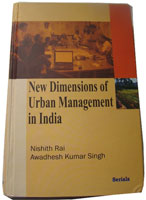
|
Title:
New Dimensions of Urban Management in India
|
About the Book:
Cities play a vital role in development and economic growth. The cities
have emerged as engines of growth however, these are at the cross roads of transition.
In India, the process of urbanization is at critical juncture. India is among the
countries at low level of urbanization however, structure and patterns of urbanization
are changing which demand for large investment in infrastructure and services for
accelerating the growth of economy. The increasing urban population has put pressure
on existing infrastructure, services and civic amenities. The gap between demand
and supply of urban infrastructure and service is gradually increasing with a result
in deterioration of space, environment and quality of life in urban areas. There
has been paradigm shift in urban governance in India. Decentralization as envisaged
in 74th Constitutional Amendment Act, 1994 has led the process of municipal reforms
and ensuring urban good governance. The escalating demand for urban infrastructure
and services has called for mobilization of resources through public-private-partnership
initiatives and introducing municipal reforms in urban local governments. Present
volume provides an insight into the various aspects and dimensions of urban development
and management in India. It comprises of eleven detailed papers on decentralized
governance, infrastructure development, environment, sanitation and hygiene promotion,
water supply, services, poverty alleviation, GIS & its applications, disaster management,
and financial management. It is hoped that the present volume will be of immense
importance for those engaged in urban development and management, policy makers,
academicians, city managers and students for understanding the dynamics of urban
development and management as well as evolving strategies for effective management
of urban affairs.
|
Author(s)/Editor(s):
Dr. Nishith Rai, Dr. Awadhesh Kumar Singh
|
ISBN:
978-81-8387-232-4
|
Year of Publication:
2010
|
|
|
|
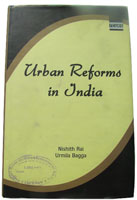
|
Title:
Urban Reforms in India
|
About the Book:
The reform agenda under JNNURM has opened up an unparalled window of opportunity
for the State Government and Urban Local Bodies to avail the Central assistance
by implementing the Reform Agenda to take up urban infrastructure improvement and
upgrade programmes on a sustainable basis. The endeavor, however, demands consistent,
coordinated and coherent action from all concerned stakeholders. Sustained administrative
and political will is most important for implementation of reforms. Reform process
is a continuous process. It is not an end in itself but it is a toll for improving
governance and sustainable development in the cities. Implementation of urban reforms
is, however, not without its operational challenges. Govt. of India has been making
consistent efforts by initiating various measures and mechanism for enhancing the
capacity of urban local bodies and state governments. The present volume would be
extremely useful and beneficial to all those interested in urban India that is steadily
and gradually making efforts for transforming its urban governance.
|
Author(s)/Editor(s):
Dr. Nishith Rai, Dr. Urmila Bagga
|
ISBN:
978-93-80685-01-4
|
Year of Publication:
2010
|
|
|
|
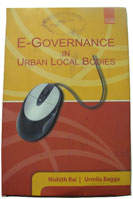
|
Title:
E-Governance in Urban Local Bodies
|
About the Book:
Among the many initiatives towards making good-governance a reality, the
implementation of e-governance by harnessing the immense potential of ICT has captured
the center stage. Governments around the world are embracing electronic governance.
The recently launched schemes of Government of India for implementation of e-governance
in urban local bodies demonstrate a holistic approach unlike the isolated one in
the past and have offered opportunities for sustained improvement in efficiency
and effectiveness in delivery of urban services. The journey to e-governance, however,
is not easy and is full of challenges. It is a continuous process of evolution,
of struggle of improvising the systems and is equally associated with financial
and political risks. Resistance to change is inevitable due to various factors.
Change management need to be dealt sensibly and tactfully. Capacity building of
all stakeholders is another important issue that needs to be addressed on priority
basis. The volume presents a variety of approaches, experiences, analysis and lesion
learnt obtained in the form of contribution from administrators, practitioners,
corporate players, academicians, experts etc. The papers discuss the wide range
of challenges, issues and options pertaining to e-governance in urban management.
The book would be of immense value and interest and highly beneficial for the policy
makers, administrators, city managers and scholars engaged and/or interested in
the field of urban management.
|
Author(s)/Editor(s):
Dr. Nishith Rai, Dr. Urmila Bagga
|
ISBN:
978-81-89267-76-6
|
Year of Publication:
2009
|
|
|
|
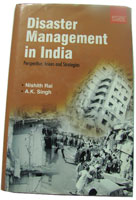
|
Title:
Disaster Management in India: Perspective, Issues and Strategies
|
About the Book:
India is one of the world’s major theaters of disasters. Floods, droughts,
cyclones, earthquakes, communal riots, conflicts, fires, epidemics and other disasters
compound the country’s chronic troubles. The social and economic progress achieved
over decades by the people, and advances in physical development, can be significantly
devastated and degraded by the disasters. Urbanization, industrialization, globalization
and economic liberalization, all have influenced human life. People are lend to
live in disaster prone areas due to severe stress on land, high prices of land and
construction of non-engineered buildings, poverty, migration and non-regulation
of urban housing constructions. Government of India through various stake-holding
agencies has been making efforts to meet the exigencies as arisen by natural disasters.
It is however, and contingency plans lack coordination, participation and accountability
of different stake-holding agencies. The local governments have to be associated
at all levels of planning and implementation of the disaster mitigation, response,
and rehabilitation and reconstruction of victims and affected areas. The papers
of the volume provide an insight into the various aspects of disaster management
in the country and it is hoped that the volume will be of immense importance to
those engaged in disaster management, policy makers, city managers, academicians
and students for understanding the dynamics of disaster management and evolving
strategies for effective management of the disasters.
|
Author(s)/Editor(s):
Dr. Nishith Rai, Dr. Awadhesh Kumar Singh
|
ISBN:
81-89267-57-4
|
Year of Publication:
2007
|
|
|
|
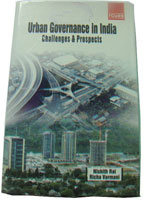
|
Title:
Urban Governance in India: Challenges and Prospects
|
About the Book:
The Government of India recently launched a 'Campaign for Good Urban Governance'
to promote the specific goals of decentralization, integration of the poor and the
marginalized, environmental sustainability, improved municipal finance, transparency,
better municipal management and capacity building. There is thus a need to improve
governance, make cities more efficient, build accountability and develop partnerships.
The state of affairs at different levels of urban governance in the country includes
effective strategies to suggest ways of further strengthening the urban local bodies
as basic functional units of democracy, especially in the post-74th Constitution
Amendment scenario. The four major themes on which the papers of this present volume
based are (i) Good Urban Governance: Concept and Practices; (ii) Urban Services
and Public-Private Partnership; (iii) Financial Administration in Urban Local Bodies;
and (iv) Capacity Building and E-Governance in Local Bodies. The articles provide
an insight into the various aspects of urban governance in the country and it is
hoped that the volume will be of immense value to those engaged in city government,
policy makers, city managers, academicians and scholars and help them in further
formulating their strategies for effective management of resource in the field of
urban administration.
|
Author(s)/Editor(s):
Dr. Nishith Rai, Dr. RichaVarmani
|
ISBN:
81-89267-35-3
|
Year of Publication:
2007
|
|
|
|
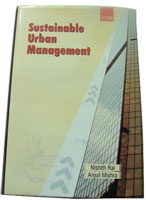
|
Title:
Sustainable Urban Management
|
About the Book:
In the 21st century, for the sustainable urban management, administration
needs to be effective, efficient, dynamic, objective, fair, honest and forward looking.
It should be open, people oriented, accountable and responsive. New technology of
information and communication, computer and telecommunication system can enhance
the capability and efficiency of management. The present book entitled “Sustainable
Urban Management” is a very timely publication and it covers a wide range of aspects
of urban management. The book represents a cross section of relevant views and experiences
in sustainable urban management in India, suggesting many measures of reforms and
improvements of urban development and management. The editors of this book have
accomplished a formidable task of bringing together a wide and very representative
range of authors and urban management in India and the book would be of great interest
to policy makers, administrators, practitioners and scholars who will greatly benefit
from its publication.
|
Author(s)/Editor(s):
Dr. Nishith Rai, Dr. Anjuli Mishra
|
ISBN:
81-89267-35-3
|
Year of Publication:
2007
|
|
|
|
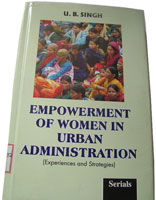
|
Title:
Empowerment of Women in Urban Administration (Experiences and Strategies)
|
About the Book:
The volume is a collection of scholarly papers contributed by academics,
administrators and practitioners at a national seminar organized and coordinated
by the editor under the auspices of the Regional Centre for Urban and Environmental
Studies, Lucknow University, Lucknow, Government of India in the Ministry of Urban
Development and Sustainable Development Forum, Patna. It is probably a maiden effort
to trace study and analyze the strategies for empowering women in urban administration
in the country. Women (half of the population) in different roles especially in
urban sector are the focal point for discussion by all the research papers. Under
the broad theoretical and policy framework the experiences in varied fields of urban
sector have been highlighted. The volume is of much benefit to the academics, teachers,
researchers and students interested in women studies.
|
Author(s)/Editor(s):
Dr. U. B. Singh
|
ISBN:
81-8387-005-8
|
Year of Publication:
2006
|
|
|
|
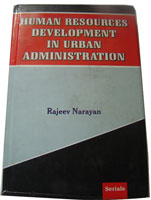
|
Title:
Human Resources Development in Urban Administration
|
About the Book:
After the enactment of the 74th amendment to the Indian Constitution, urban
local bodies in the country have been granted constitutional status. These grass
root institutions have gained importance and are destined to play an important role
in the federal structure. The Book deals with the Municipal Human Resources specially
in India and U.P. in particular. It trances history of Municipal Administration
in India and U.P; it gives a detailed picture of the Municipal Humane Resource in
the country and U.P. The Book discusses in detail the Recruitment and Selection
procedure for municipal employees in U.P, besides dealing in detail the Training
and Development policy, the practiced procedure of Performance Appraisal, the schemes
for Personnel Welfare etc. The book ends with highlighting a number of Suggestions,
which will be of benefit to the policy makers, academics, researchers and students
of Urban Administration.
|
Author(s)/Editor(s):
Dr. Rajeev Narayan
|
ISBN:
81-8387-025-2
|
Year of Publication:
2006
|
|
|
|
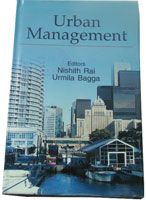
|
Title:
Urban Management
|
About the Book:
The enactment of 74th Constitution Amendment Act in 1992 in the post-independence
period is the most important development in the country with a view to strengthen
the urban local bodies. Besides granting Constitutional status to urban local bodies,
it made a remarkable beginning by recognizing the role of municipal government in
urban administration. The present volume covers various papers based on the four
important themes relating to implementation of 74th Constitution Amendment Act in
states. Major themes include: (i) Conformity legislations in States; (ii) Expanding
functional domain of urban local bodies and devolution of financial powers; (iii)
Capacity building of urban local bodies; and (iv) Urban infrastructure and delivery
of services. These articles provide an insight into the various facets of urban
administration and management and also suggest a reform agenda that needs to be
implemented in order to achieve the ultimate goal of good governance. It is hoped
that this book would be beneficial to the scholars of urban administration, especially
to those who are engaged in policy making and decision making relating to urban
development and management at the Central/State/City levels in formulating strategies
for future action.
|
Author(s)/Editor(s):
Dr. Nishith Rai, Dr. Urmila Bagga
|
ISBN:
81-89267-24-8
|
Year of Publication:
2006
|
|
|
|
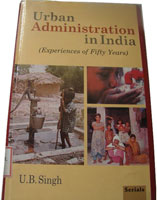
|
Title:
Urban Administration in India (Experiences of Fifty Years)
|
About the Book:
Urban administration in India has attracted the attention of policy formulators,
planners, administrators, sociologists and academia in recent few decades. Although
the country has been witnessing a fall in growth in urban population, the concentration
of population in larger urban areas has resulted into an urban chaos. The uncontrolled,
unplanned and haphazard growth of urban centers is leading to great pressure on
urban services, mushrooming of habitations with inhuman surrounding, degradation
in environment, polluted air, water and noise. The cities are becoming inhabitable
decade after decade. The institutional mechanism has either failed to cope with
the situation or become weak and inefficient. The people are more vocal and demanding
but less responsible and civil. The irreversible trend of urbanization warrants
sustainable interventions. The first fifty years of Independence have faced many
ups and downs in the sphere of urban administration. The historic 74th Amendment
to the Country’s Constitution was a major policy directive enacted during the period.
This harbinger effort is a turning point in the life and functioning of urban local
government. The volume makes an assessment of strategies for administering the urban
areas in the country.
|
Author(s)/Editor(s):
Dr. U. B. Singh
|
ISBN:
81-86771-51-4
|
Year of Publication:
2004
|
|
|
|
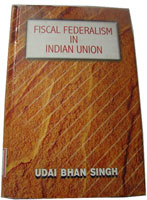
|
Title:
Fiscal Federalism in India Union
|
About the Book:
This book attempts to assess the functional domain and financial health
of urban local bodies in most of the states in India where Finance Commissions have
submitted their reports. Discussing the taxation powers, it analyses the recommendations
of State Finance Commissions. The analysis has been grouped mainly as augmenting
existing sources tax and non-tax, assignment of tax sources, sharing, grants-in-aid
and miscellaneous. Highlighting the present urban scenario, it conceptualizes the
principles of decentralization in the historical perspective. The analysis covers
the states of Andhra Pradesh, Assam, Karnataka, Kerala, Madhya Pradesh, Manipur,
Orissa, Punjab, Rajasthan, Tamil Nadu, Uttar Pradesh and West Bengal.
|
Author(s)/Editor(s):
Dr. U. B. Singh
|
ISBN:
81-7022-982-0
|
Year of Publication:
2003
|
|
|
|
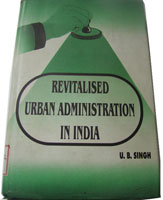
|
Title:
Revitalized Urban Administration in India
|
About the Book:
With the down of Independence, the enhancement of status of urban infrastructure
was urgently felt by the state governments keeping in view all the relevant aspects
having deep bearing on developmental schemes. The structure of the local bodies
was revitalized and strengthened by the Amendment Act of the Parliament. Thus the
main thrust was to devise ways and means which should cover up schemes having deep
impact on the lives of people in cities and town. Such welfare schemes did prove
as valuable assets boosting the economy with rich dividends. This unprecedented
experiment brought about a remarkable change with the painstaking efforts of our
entrepreneurs. This book of twenty-four articles contributed by eminent scholars
would be useful for the academic community in India and abroad.
|
Author(s)/Editor(s):
Dr. U. B. Singh
|
ISBN:
81-7835-077-7
|
Year of Publication:
2002
|
|
|
|
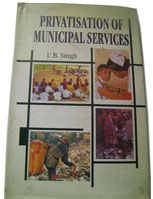
|
Title:
Privatization of Municipal Services
|
About the Book:
The economic scenario in the country has witnessed a tremendous change
in the last decade. The advent of liberalization has broadened the scope for private
sector. The new economic policy has drifted from a balanced mixed economy to open
one with more roles set for private sector. Market mechanism is gaining momentum
in a phased manner. The private sector, thus, is getting more and more broadened
areas of operation. However, the private sector is not confined to the industrial
arena, but is also entering into the provision of services as well. Municipal services
are not exception. In this backdrop the book, basically an edited version of the
papers presented and discussed at a two day National Seminar on ‘Privatization of
Municipal Services in India’, provides an input to the decision makers for formulating
policy for opening the provision of municipal services for the private sector, In
our context the present scenario is dominated by decentralization, which transfers
monopoly from one hand to other. Whereas, the congenial atmosphere for privatization
requires scope for competitiveness, public sector as one of the stakeholders. The
volume conceptualizes successfully the practices of privatization and the rationale
thereof besides critically analyzing the pros and cons of privatization especially
of municipal services. A few case studies present a galaxy of privatization of services
in different part of the globe. The book initiates the academic process of privatization
in the area of the civic services, probably the pioneer attempt delineating scope
of privatization in municipal services.
|
Author(s)/Editor(s):
Dr. U. B. Singh
|
ISBN:
81-7678-069-0
|
Year of Publication:
2001
|
|
|
|
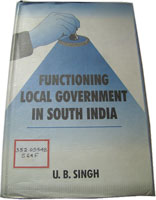
|
Title:
Functioning Local Government in South India
|
About the Book:
This book sincerely attempts to discuss the municipal administration in
Southern states of the country in the post 74-CAA era. The legal structural frame
work of urban governance in the four major developed states in the country is highlighted
in the book. Separate sections have been devoted to the urban local bodies in the
transitional, smaller and larger urban areas. The mandatory provisions enshrined
in the constitution regarding the Ward Committees, District and Metropolitan Planning
Committees. Finance Commission and State Election Commission are discussed separately.
The consolidated picture in all the four states at a glance is depicted in Annexures
appended at the end. This book will definitely prove to be a pioneering work on
the subject. It would be of immense help to the academicians, researchers and students
in the field of administration in general and urban administration in particular.
|
Author(s)/Editor(s):
Dr. U. B. Singh
|
ISBN:
81-212-0715-0
|
Year of Publication:
2000
|
|
|
|
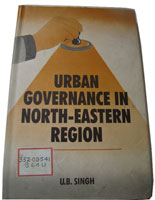
|
Title:
Urban Governance in North Eastern Region
|
About the Book:
Urban local government in the country has gradually been gaining importance
with the increase in urban population since 1961. However, it could attract due
attention only after the national Commission on Urbanization studied all aspects
of urban management. In this context, the Indian Parliament passes a bill in 1002,
which became the 74th Amendment to the Constitution. It is a landmark in the history
of urban governance in the country. The Act not only constitutionalizes the urban
local government but also provides it with stability in addition to facilitating
democratic decentralization and revitalizing these grass root institutions. A lot
of work has been done in the field or rural management but no attempt has been made
so far to present a comparative picture of urban governance in the scheduled areas
which have been made so far to present a comparative picture of urban governance
in the scheduled areas which have been given a special status in the Indian constitution.
The proposed volume attempts to trace the historical development of urban local
government in the North Eastern States, besides discussing the trends of urbanization
and urban problems in the area. The book earnestly studies various provisions of
Municipal Laws enacted and practiced in the post-74th Constitution Amendment Act
era. A study of law, governing autonomous areas has also been made. The book must
be of immense help to the students of public administration.
|
Author(s)/Editor(s):
Dr. U. B. Singh
|
ISBN:
81-212-06661-8
|
Year of Publication:
1999
|
|
|
|
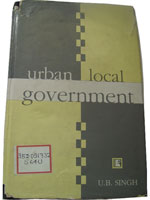
|
Title:
Urban Local Government
|
About the Book:
The 74th Constitutional Amendment Act is a landmark in the history of urban
local self-government in the country. It revolutionizes the urban administration
in India. It envisages certain essential measures for revitalizing and strengthening
the urban local bodies besides ensuring people’s participation in local administration
and decision-making. The present book presents an overview of urban local government
in the states of Bihar, Madhya Pradesh, Orissa and Uttar Pradesh. It discusses at
length the new facets of local administration in these states.
|
Author(s)/Editor(s):
Dr. U. B. Singh
|
ISBN:
81-7033-380-8
|
Year of Publication:
1997
|
|
|
|
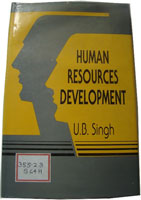
|
Title:
Human Resources Development
|
About the Book:
Human Resources Development (HRD) in Public Administration is still in
the stage of development, more so in the public sector. It has been attempted in
the book to grasp the intricacies of HRD with two-fold facets, i.e., training as
‘tool of improvement of specific skills of the non-managers’, and ‘development of
the managers’. The book analytically discusses the ways to convert the traditional
personnel functions to the development mechanisms. It urges upon the need of HRD
even before the selection of the personnel. How the conventional tool of performance
appraisal can be used for developing personnel to help achieve the organizational
objectives is one of the many themes of the book. This study of the UPTRON Group,
an upcoming public sector enterprise in Uttar Pradesh, attempts to prepare a base
for other and introduce the HRD System. It will be a valuable guide for researchers,
HRD professional and corporate managers.
|
Author(s)/Editor(s):
Dr. U. B. Singh
|
ISBN:
81-7033-148-7
|
Year of Publication:
1992
|
|
|
|
|